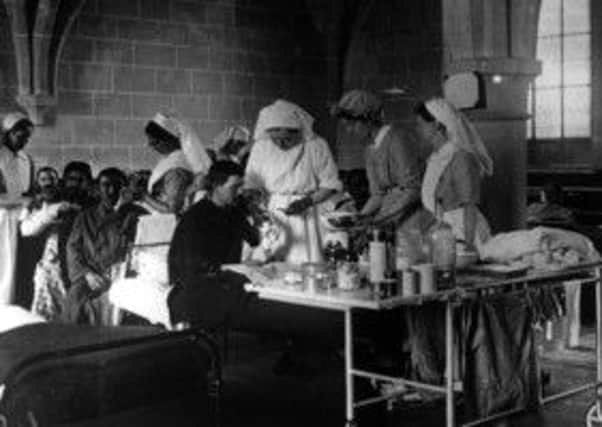Remembering Scots contributions to WW1 medicine


In August 1915, Dr Charles McKerrow left his practice at Barns Street, Ayr and volunteered for service as a medical officer on the Western Front. His father, George, also a GP, continued to care for his patients but eventually retired. Jean, the wife who had helped him run the small practice, transferred her energies to keeping her husband and his team of stretcher-bearers supplied with extra food and medical provisions when Army rations ran low.
McKerrow wrote to his wife often from his posting with the 10th Battalion Northumberland Fusiliers. He wasn’t always honest with her, telling her not to worry, that he was only a doctor and could hide amongst the baggage. But the diary he kept in secret in his dugout in the trenches told a very different story. McKerrow was never one for hiding. Time and again, he went out into no-man’s land to retrieve casualties. He was gassed, and dodged shells and sniper fire. During the first week of the battle of the Somme he worked for three days straight, dressing the wounds of over a thousand men. He only stopped when his orderly chased him into a corner of the medical aid post, forced him to sit down and drink some coffee and gave a him a fresh pair of socks.
Advertisement
Hide AdMcKerrow was never “only a doctor”. The military medical system had undergone a complete reorganisation in the first year of the war. The new system relied entirely on men of his quality and commitment to operate effectively. McKerrow trained a team of 36 stretcher-bearers to become a new kind of medical auxiliary – the prototypes of today’s Combat Medical Technicians. Thanks to weekly lectures and constant supervision, the team could not only find and carry away a casualty, they could treat him as well, stopping serious bleeding, splinting broken bones, saving lives even before they handed them over to the doctor at the medical aid post. He trained bearers to give injections, so the whole battalion could be kept inoculated – a necessity on the foetid battlefields of Flanders. Then he retrained whole new teams as bearers were killed and replaced.
McKerrow never let his men see the despair that he felt at every loss. He understood how their confidence in his abilities was crucial to morale. Within months of arriving on the Western Front, he was widely held to be the finest medical officer in the division. He made a daily round of the whole battalion, taking care to notice new arrivals who would otherwise worry that the doctor would miss them on the battlefield if he didn’t know their faces. Such was his reputation that ill or lightly wounded men from other battalions sneaked away to be treated by him and his team. His commitment to the men around him was total. He insisted on testifying at a court-martial for a soldier accused of a self-inflicted wound. Barely containing his fury, he pointed out that the wound was completely without powder burns, so the shot must have been fired from some distance away. The soldier was acquitted. Another life saved.
What sustained him were the long and surprisingly efficient supply lines from Barnes Street to Flanders. Jean sent scissors, socks and shirts for himself and the bearers to replace those worn out by hard service. Somehow she got locally-smoked kippers to him, and sent out his fishing rod so he could see what was to be caught in the local rivers (although he resorted to using explosives to get enough for a full fish supper for the men). Regular copies of the Ayrshire Post meant he could keep in touch with his home town, and she made plans for them for after the war, a trip of a lifetime to India, so that he had something to look forward to.
But McKerrow would never come home. On 20 December 1916, he went out on one of his daily rounds to meet the replacements for the thousands of Northumberlands killed during the Somme. A huge shell exploded nearby and he was badly wounded in the stomach. He knew as well as anyone that the wound was mortal so he spent his last hours in the field hospital ward worrying about the other men injured in the attack. He died that night and was buried in the Lijssenthoek military cemetery.
It must have been agony for her, but Jean kept all his letters and diaries and carefully transcribed them into a set of notebooks kept today in a single box at the Imperial War Museum in London. McKerrow’s clear recollections and eye for detail have created a truly invaluable record of the life and work of an average but far from ordinary medical officer on the Western Front in the Great War.
• Emily Mayhew is the author of Wounded: From Battlefield to Blighty, 1914 to 1918 (Bodley Head, £20). On Monday at 6pm, she will be giving the Remembrance Day lecture on Charles McKerrow and other unknown medical heroes of the Great War at the Royal College of Surgeons, Edinburgh, an event which is both free and open to members of the public.